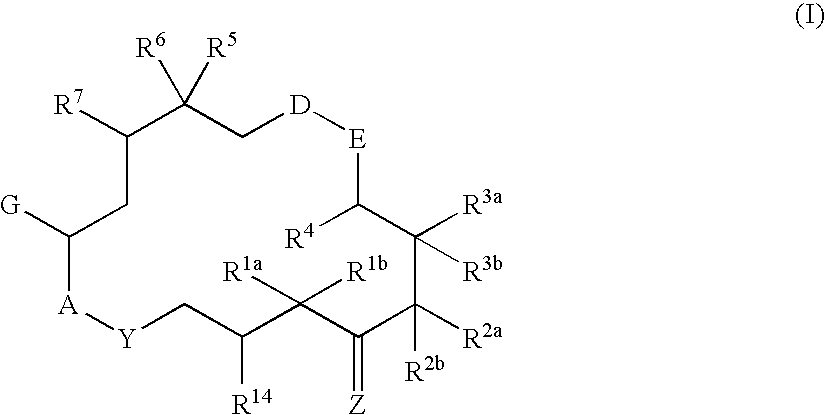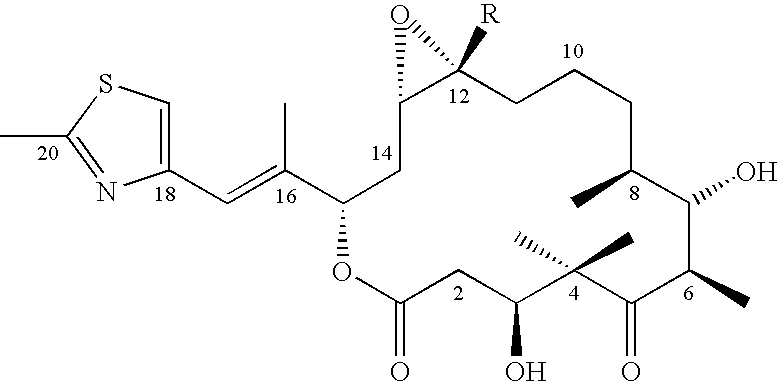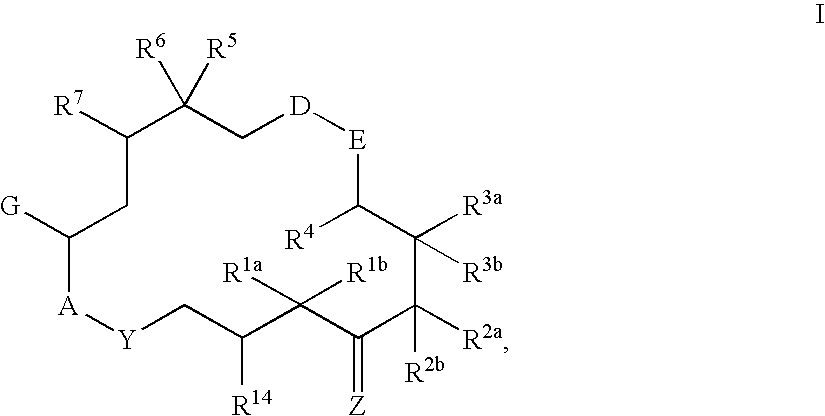6-Alkenyl-, 6-alkinyl- and 6-epoxy-epothilone derivatives, process for their production, and their use in pharmaceutical preparations
a technology of epoxyepothilone and process, which is applied in the field of 6alkenyl, 6alkinyl 6epoxyepothilone derivatives, process for their production, and their use in pharmaceutical preparations, can solve the problems of insufficient chemical stability or metabolic stability of natural substances
- Summary
- Abstract
- Description
- Claims
- Application Information
AI Technical Summary
Benefits of technology
Problems solved by technology
Method used
Image
Examples
example 1
4S,7R,8S,9S,13Z,16S (E))-4,8-Dihydroxy-16-(1-methyl-2-(2-pyridyl)ethenyl)-1-oxa-5,5,9,13-tetramethyl-7-(but-3-in-1-yl)-cyclohexadec-13-ene-2,6-dione
Production of (4S(4R,5S,6S,10E / Z,13S,14E))-4-(13-hydroxy-5-(tetrahydro-2H-pyran-2-yloxy)-2,6,10,14-tetramethyl-3-oxo-15-(2-pyridyl)-4-(but-3-in-1-yl)-undec-6-in-2-yl)-2,2-dimethyl-[1,3]dioxane; Variant I:
example 1a
(3RS,4S)-4-(2-Methyl-3-hydroxy-8-(trimethylsilyl)-oct-7-in-2-yl)-2,2-dimethyl-[1,3]dioxane
[0601] The solution of 6.33 g (34 mmol) of (4S)-4-(2-methyl-1-oxo-prop-2-yl)-2,2-dimethyl-[1,3]dioxane, which was produced analogously to the process described in DE 197 51 200.3, in 10 ml of anhydrous tetrahydrofuran is mixed in portions under an atmosphere of dry argon with the solution of a total of 50 mmol of 5-trimethylsilyl-pent-4-in-1-yl-magnesium bromide in tetrahydrofuran, allowed to heat to 60° C. and stirred for 1.5 hours. It is poured onto water and extracted several times with ethyl acetate. The combined organic extracts are washed with water and saturated sodium chloride solution and dried on sodium sulfate. The residue that was obtained after filtration and removal of the solvent is purified by chromatography on fine silica gel with a gradient system that consists of n-hexane and ethyl acetate. 6.22 g (19 mmol, 56%) of the chromatographically separable 3R- and 3S-epimers of the ...
example 1b
(4S)-4-(2-Methyl-3-oxo-8-(trimethylsilyl)-oct-7-in-2-yl)-2,2-dimethyl-[1,31dioxane
[0603] The solution of 6.22 g (19 mmol) of a mixture of the compounds, produced according to Example 1a, in 200 ml of anhydrous dichloromethane is mixed with a molecular sieve (4A, about 20 pellets), 4.01 g of N-methylmorpholino-N-oxide, 335 mg of tetrapropylammonium perruthenate and stirred for 16 hours at 23° C. under an atmosphere of dry argon. It is concentrated by evaporation, the crude product that is obtained is purified by chromatography on fine silica gel with a gradient system that consists of n-hexane and ethyl acetate. 5.17 g (15.9 mmol, 84%) of the title compound is isolated as a colorless oil.
[0604]1H-NMR (CDCl3): δ=0.15 (9H), 1.07 (3H), 1.13 (3H), 1.28-1.36 (1H), 1.33 (3H), 1.41 (3H), 1.53-1.81 (3H), 2.22 (2H), 2.62 (2H), 3.85 (1H), 3.97 (1H), 4.06 (1H) ppm.
PUM
 Login to View More
Login to View More Abstract
Description
Claims
Application Information
 Login to View More
Login to View More - R&D
- Intellectual Property
- Life Sciences
- Materials
- Tech Scout
- Unparalleled Data Quality
- Higher Quality Content
- 60% Fewer Hallucinations
Browse by: Latest US Patents, China's latest patents, Technical Efficacy Thesaurus, Application Domain, Technology Topic, Popular Technical Reports.
© 2025 PatSnap. All rights reserved.Legal|Privacy policy|Modern Slavery Act Transparency Statement|Sitemap|About US| Contact US: help@patsnap.com



